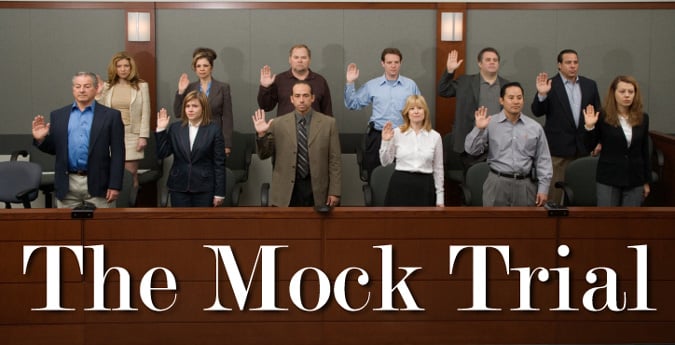Litigation can be a complex and risky process, and many lawyers have found it beneficial to conduct mock trials to gain insight into the strengths and weaknesses of their cases, especially in cases with millions or billions at stake. However, there are also some reasons why you may not want to have a mock trial. In this blog post, we will explore 10 reasons you should have a mock trial and 10 reasons you shouldn’t.
10 Reasons You Should Have a Mock Trial
- Gain Insight into Juror/Judge Perception: Mock trials provide an opportunity to test the waters and gauge how jurors & judges might perceive your case.
- Identify Weaknesses in Your Case: Mock trials allow you to identify weaknesses in your case that you may not have considered before.
- Test Your Arguments: Mock trials provide an opportunity to test your arguments and refine them to make them more effective.
- Improve Your Presentation Skills: Mock trials allow you to practice your presentation skills in front of a friendly audience.
- Develop a Case Strategy: Mock trials can help you develop a case strategy that will be effective in court.
- Save Time and Money: Mock trials can save you time and money by identifying weaknesses in your case before you go to court.
- Build Confidence: Mock trials can help build confidence in your case, which can be invaluable come trial time.
- Get Realistic Feedback: Mock trials provide realistic feedback that can help you make better decisions about your case.
- Test Your Witnesses: Mock trials allow you to test the effectiveness of your witnesses and identify areas where they may need more preparation.
- Refine Your Theme: Mock trials provide an opportunity to refine your theme and build a stronger case narrative.
10 Reasons You Shouldn’t Have a Mock Trial
- Cost: Mock trials can be expensive, especially if you hire outside judges/jurors and fly in the entire trial team.
- Time: Mock trials can take a lot of time and resources to plan and execute.
- Limited Resources: If you have limited resources, you may not have the time or money to conduct a mock trial.
- False Confidence: A successful mock trial can give you false confidence and lead to overconfidence in your case.
- Limited Sample Size: The sample size in a mock trial may be too small to accurately predict the outcome of a real trial.
- Unrealistic Conditions: Mock trials may be conducted under unrealistic conditions that don’t accurately reflect what will happen in court.
- Overreliance on Feedback: Lawyers may become over-reliant on feedback from a mock trial, which may not be accurate or representative.
- Limited Objectivity: Lawyers may become too emotionally invested in their case and lose objectivity during a mock trial.
- Limited Options: You may not get a representative sample if you have limited options for mock trial participants.
- Misleading Results: The results of a mock trial may be misleading if the participants have a bias or if the simulation is not accurate.
Mock trials can be a valuable tool for lawyers looking to gain insight into their cases. However, there are also some reasons why you may not want to have a mock trial. It’s important to consider the pros and cons carefully and make an informed decision based on your circumstances. Remember that a mock trial's purpose may only be to assess the actual results. They may also be designed to determine what questions to ask in voir dire.
Other articles and resources for those considering a mock trial:
- Testing Graphics in a Mock Trial Setting
- Researching Your Judge Before a Real or Mock Trial
- 10 Videos Our Mock Trial Consultants Recommend
- Focus Groups Contrasted with a Mock Trial
- Learn More About A2L Jury Consulting Services
- More about a Mock Trial from A2L Consulting
- FREE DOWNLOAD: Storytelling for Persuasion - 144-page complimentary book
- 10 Things Every Mock Jury Ever Has Said
- Why Do I Need A Mock Trial If There Is No Real Voir Dire?
- 3 Ways to Force Yourself to Practice Your Trial Presentation
- 7 Questions You Must Ask Your Mock Jury About Litigation Graphics
- 11 Problems with Mock Trials and How to Avoid Them
- 12 Astute Tips for Meaningful Mock Trials
- Trending: Mock Trial Testing of Litigation Graphics AND Arguments
- 10 Suggestions for Conducting Mock Bench Trial Consulting Exercises
- Mock Trials: Do They Work? Are They Valuable?
- The 13 Biggest Reasons to Avoid Last-Minute Trial Preparation
- The Magic of a 30:1 Presentation Preparation Ratio
- 11 Surprising Areas Where We Are Using Mock Exercises and Testing
- Accepting Litigation Consulting is the New Hurdle for Litigators






Leave a Comment